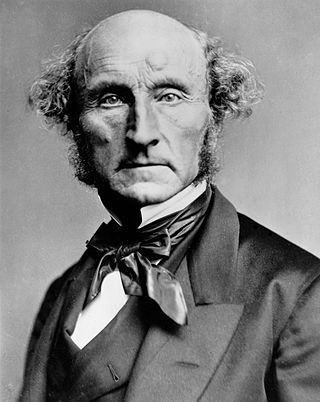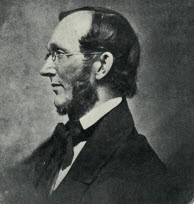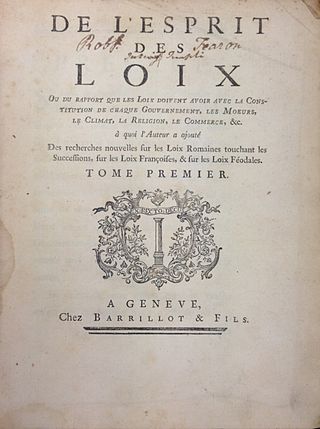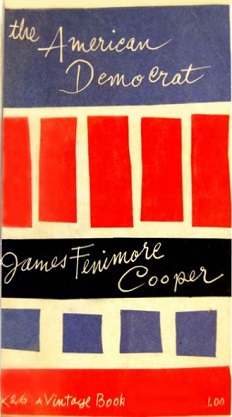Classical liberalism is a political tradition and a branch of liberalism that advocates free market and laissez-faire economics; civil liberties under the rule of law with special emphasis on individual autonomy, limited government, economic freedom, political freedom and freedom of speech. It gained full flowering in the early 18th century, building on ideas stemming at least as far back as the 16th century within the Iberian, Anglo-Saxon, and central European contexts and was foundational to the American Revolution and "American Project" more broadly.

John Stuart Mill was an English philosopher, political economist, politician, and civil servant. One of the most influential thinkers in the history of classical liberalism, he contributed widely to social theory, political theory, and political economy. Dubbed "the most influential English-speaking philosopher of the nineteenth century" by the Stanford Encyclopedia of Philosophy, he conceived of liberty as justifying the freedom of the individual in opposition to unlimited state and social control.

Political philosophy or political theory is the philosophical study of government, addressing questions about the nature, scope, and legitimacy of public agents and institutions and the relationships between them. Its topics include politics, liberty, justice, property, rights, law, and the enforcement of laws by authority: what they are, if they are needed, what makes a government legitimate, what rights and freedoms it should protect, what form it should take, what the law is, and what duties citizens owe to a legitimate government, if any, and when it may be legitimately overthrown, if ever.

Alexis Charles Henri Clérel, comte de Tocqueville, usually known as just Tocqueville, was a French aristocrat, diplomat, political scientist, political philosopher and historian. He is best known for his works Democracy in America and The Old Regime and the Revolution (1856). In both, he analyzed the living standards and social conditions of individuals as well as their relationship to the market and state in Western societies. Democracy in America was published after Tocqueville's travels in the United States and is today considered an early work of sociology and political science.

De La Démocratie en Amérique is a classic French text by Alexis de Tocqueville. Its title literally translates to Democracy in America. In the book, Tocqueville examines the democratic revolution that he believed had been occurring over the previous several hundred years.
Pluralism as a political philosophy is the recognition and affirmation of diversity within a political body, which is seen to permit the peaceful coexistence of different interests, convictions, and lifestyles. While not all political pluralists advocate for a pluralist democracy, this is most common as democracy is often viewed as the most fair and effective way to moderate between discrete values. As put by arch-pluralist Isaiah Berlin, "let us have the courage of our admitted ignorance, of our doubts and uncertainties. At least we can try to discover what others ... require, by ... making it possible for ourselves to know men as they truly are, by listening to them carefully and sympathetically, and understanding them and their lives and their needs... ." Pluralism thus tries to encourage members of society to accommodate their differences by avoiding extremism and engaging in good faith dialogue. Pluralists also seek the construction or reform of social institutions in order to reflect and balance competing principles.
The tyranny of the majority is an inherent weakness to majority rule in which the majority of an electorate pursues exclusively its own objectives at the expense of those of the minority factions. This results in oppression of minority groups comparable to that of a tyrant or despot, argued John Stuart Mill in his 1859 book On Liberty.

Mass society is a concept that describes modern society as a monolithic force and yet a disaggregate collection of individuals. It is often used pejoratively to refer to a society in which bureaucracy and impersonal institutions have replaced some notion of traditional society, leading to social alienation.

Francis Bowen was an American philosopher, writer, and educationalist.

The values and ideals of republicanism are foundational in the constitution and history of the United States. As the United States constitution prohibits granting titles of nobility, republicanism in this context does not refer to a political movement to abolish such a social class, as it does in countries such as the UK, Australia, and the Netherlands. Instead, it refers to the core values that citizenry in a republic have, or ought to have.

The Spirit of Law, also known in English as The Spirit of the Laws, is a treatise on political theory, as well as a pioneering work in comparative law by Montesquieu, published in 1748. Originally published anonymously, as was the norm, its influence outside France was aided by its rapid translation into other languages. In 1750 Thomas Nugent published the first English translation. In 1751 the Roman Catholic Church added De l'esprit des lois to its Index Librorum Prohibitorum.

Comte Gustave Auguste Bonnin de la Bonninière de Beaumont was a French magistrate, prison reformer, and travel companion to the famed philosopher and politician Alexis de Tocqueville. While he was very successful in his lifetime, he is often overlooked and his name is synonymous with Tocqueville's achievements.
Soft tyranny is an idea first developed by Alexis de Tocqueville in his 1835 work titled Democracy in America. It is described as the individualist preference for equality and its pleasures, requiring the state – as a tyrant majority or a benevolent authority – to step in and adjudicate. In this regime, political leaders operate under a blanket of restrictions and, while it retains the practical virtues of democracy, citizens influence policymaking through bureaucrats and non-governmental organizations. This is distinguished from despotism or tyranny in the sense that state of government in such democratic society is composed of guardians who hold immense and tutelary (protective) power.
Socialist democracy is a political system that aligns with principles of both socialism and democracy. It includes ideologies such as council communism, democratic socialism, and soviet democracy, as well as Marxist democracy like the dictatorship of the proletariat. It was embodied in the Soviet system (1922–1991). It can also denote a system of political party organization like democratic centralism, or a form of democracy espoused by Marxist–Leninist political parties or groups that support one-party states. The Socialist Federal Republic of Yugoslavia (1945–1992) styled itself a socialist democracy, as did the People's Republic of Bulgaria (1946–1990) and the Socialist Republic of Romania (1947–1989).
Liberalism is a political and moral philosophy based on the rights of the individual, liberty, consent of the governed, political equality, and equality before the law. Liberals espouse various views depending on their understanding of these principles but generally support private property, market economies, individual rights, liberal democracy, secularism, rule of law, economic and political freedom, freedom of speech, freedom of the press, freedom of assembly, and freedom of religion, constitutional government, privacy rights, and regulations on the role of technology in the private and public sectors. Liberalism is frequently cited as the dominant ideology of modern history.

The American Democrat: Or, Hints on the Social and Civic Relations of the United States of America, a political essay written by American republican author James Fenimore Cooper, was published initially in New York State in 1838. Originally intended as a textbook on the American republican democracy, the work analyzes the social forces that shape, and can ultimately corrupt such a system.
The Alexis de Tocqueville Tour was a series of programs produced by C-SPAN in 1997 and 1998 that followed the path taken by Alexis de Tocqueville and Gustave de Beaumont through the United States during their 1831–32 visit. It explored many of the themes that Tocqueville discussed in Democracy in America, the two-volume work that he wrote based on his American travels. A C-SPAN School Bus traveled to each of the stops made by Tocqueville and Beaumont. Many of the Tocqueville programs were segments of C-SPAN's morning news and call-in show, Washington Journal, and they were timed to coincide with the anniversaries of Tocqueville and Beaumont's visits to those places. Typically, they were about 30 minutes long, and incorporated calls, e-mails, and faxes from viewers.
Liberal socialism is a political philosophy that incorporates liberal principles to socialism. This synthesis sees liberalism as the political theory that takes the inner freedom of the human spirit as a given and adopts liberty as the goal, means and rule of shared human life. Socialism is seen as the method to realize this recognition of liberty through political and economic autonomy and emancipation from the grip of pressing material necessity. Liberal socialism refuses to abolish capitalism with a socialist economy and supports a mixed economy that includes both social ownership and private property in capital goods.

Victor Ambroise Lanjuinais was a French politician. He was a deputy from 1838 to 1848, and minister of Agriculture and Commerce in the second cabinet of Odilon Barrot.
The political culture of the United States has been influenced by the various European nations which colonized the Americas from the 15th century onwards. During the colonial era of American history, European settlers began emigrating to Colonial America, influencing the political culture in each region they settled in. These influences continued to play a major role in the politics of the United States after the American Revolution and the establishment of the U.S. as an independent country.











